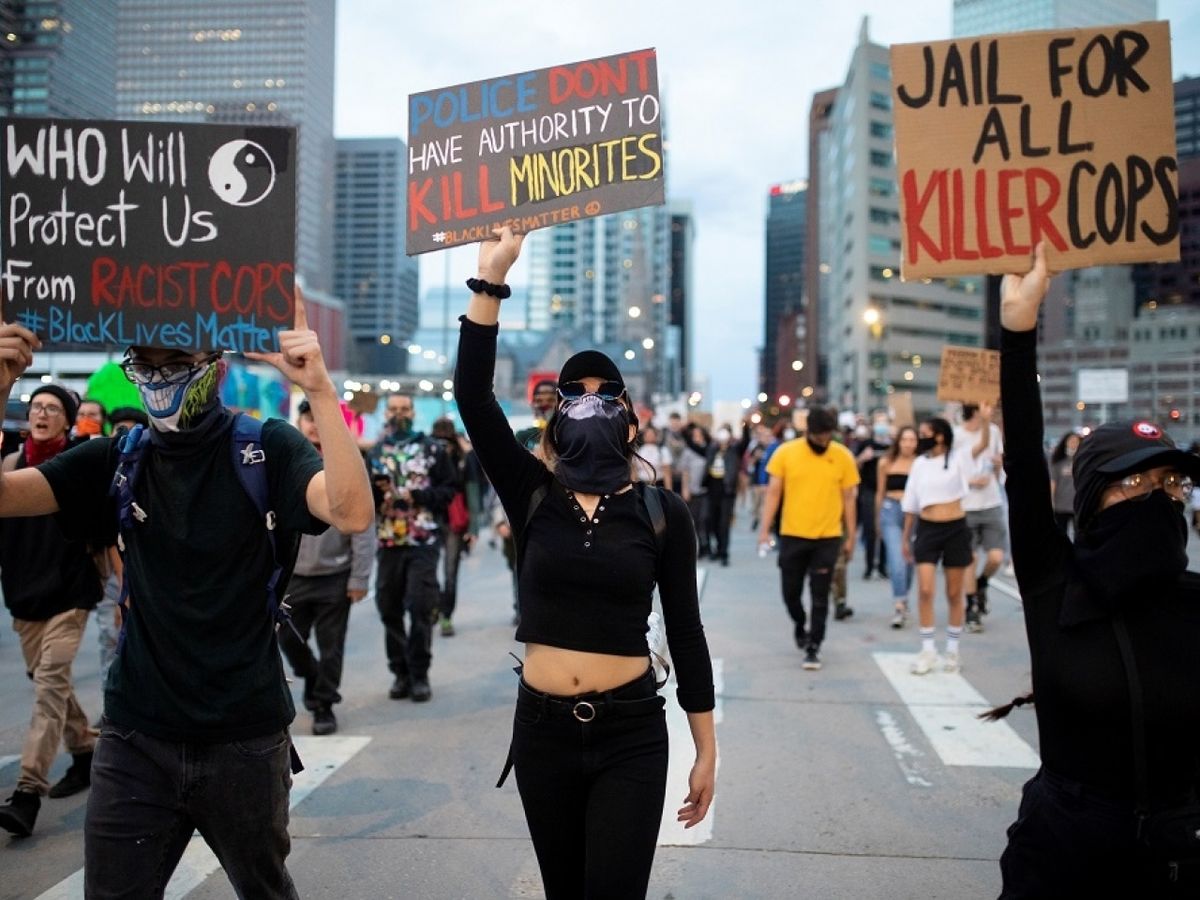What is the Community Oriented Policing Services program?

A few minutes every morning is all you need.
Stay up to date on the world's Headlines and Human Stories. It's fun, it's factual, it's fluff-free.
With videos of police violence surfacing amid nationwide protests, there have been bipartisan calls for law enforcement agencies to be reformed. These recommended reforms have run the gamut from internal changes within police departments to abolishing the police entirely. With no consensus in sight, it’s clear that policing in the United States is poised to remain a hot button political topic throughout the 2020 election.
One possible reform could be the Community Oriented Policing Services (COPS) program, which provides federal grants to local police departments. The program, originally created by presumptive Democratic nominee Joe Biden and signed into law by former President Bill Clinton in 1994, has resulted in billions of federal dollars being spent on funding more police officers across the US.
The politics of policing
President Donald Trump has come out firmly in support of the police, even falsely saying that a 75-year-old man who was seen on video being knocked over by police in Buffalo, New York, could have been “an ANTIFA provocateur.”
In his time in office, Trump has frequently expressed support for the police and has received gratitude from the pro-police Blue Lives Matter movement for it.
By contrast, Biden, Trump’s likely rival in the 2020 election, has attempted to walk the line between showing support for the police and calling for reforms. In an interview with CBS Evening News, Biden said he does not “support defunding the police” but was in favor of “conditioning federal aid to police, based on whether or not they meet certain basic standards of decency and honorableness.”
There are numerous programs and grants that provide federal dollars to local law enforcement agencies, but the COPS program is likely to be in the spotlight, specifically because Biden helped pass it into law.
The origins of the Community Oriented Policing Services program
The COPS program was originally passed within the Violent Crime Control and Law Enforcement Act of 1994, written by then-Senator Biden, and is now generally referred to simply as the 1994 crime bill. The crime bill is frequently blamed for mass incarcerations, especially among minorities, and has already become a political risk for Biden’s candidacy, amplified by the fact that he’s continued to defend it.
It’s been argued that the crime bill is not to blame for incarceration rates because it dealt with sentencing at the federal level, not at the state level where most prisoners are sentenced. Regardless, the reality is that the COPS program has led to an increased police presence across America.
In the 1990s, COPS program grants were touted heavily by the Clinton administration, which said the money would put 100,000 more police on the streets of America, an increase of 20% nationally. At the end of his presidency, Clinton credited the increased police presence and other criminal justice reforms as bringing about the “lowest crime rates in a generation.”
The Biden campaign’s policy position on criminal justice reform not only maintains the COPS program, but vows to invest an additional US$300 million into it.
Funding the COPS program
With calls for defunding the police gaining traction, the COPS program is an obvious target.
Since 1994, the COPS Office has given out over US$14 billion in grants to state, local, tribal and territorial law enforcement agencies. However, while the COPS program has continued to be reauthorized by Congress over the years, its funding and parameters have shifted considerably.
From 1995 to 1999, the program received an average of US$1.4 billion for the purpose of funding 100,000 more police officers. But in 1998, the program’s focus turned towards helping agencies “purchase new equipment, combat methamphetamine production, upgrade criminal records, and improve their forensic science capabilities” according to the Congressional Research Service.
Throughout the 2000s, the COPS Office worked with less funding, dropping as low as US$472 million in 2006. In 2009, funding saw a nearly threefold spike over 2008 to nearly US$1.6 billion, its highest yearly funding ever. Since then, though, the funding has steadily declined. From 2012 to 2017, funding averaged US$200 million.
The COPS Office funding increased to US$276 million in 2018 and US$304 million in 2019, still far short of the highs of the program. Part of the reason funding has dropped from COPS is that much of its original oversight has been shifted to other programs, specifically the Office of Justice Programs (OJP).
In 2019, the OJP, which oversees multiple law enforcement programs, requested US$1.13 billion for state and local law enforcement assistance, to “provide federal leadership on high-priority criminal justice concerns such as law enforcement safety, violent crime, gang activity, offender recidivism, illegal drugs, law enforcement information sharing, and related justice system issues.”
With its smaller budget, it has been suggested that COPS be merged into OJP. Still, in 2020 alone, the program awarded nearly US$400 million in grants nationwide that provided for the hiring of 2,732 full-time law enforcement professionals.
Calls for police reform
Defunding the police remains a political risk, with most Americans saying they oppose cutting funding to police departments. However, the widespread protests against police brutality have made it clear that there is an appetite for reform.
The Justice in Policing Act of 2020, legislation aimed at reforming law enforcement, was revealed by House Democrats on Monday, June 8. It would eliminate qualified immunity for police officers in cases of civil and criminal misconduct. It also requires body cameras and imposes a federal ban on chokeholds and no-knock warrants.
However, the bill does not cut police budgets and was written entirely by Democrats. For those reasons, it has already received criticism from Republicans and is unlikely to impress activists who believe the only way to reform the police is to defund and possibly abolish the police.
Have a tip or story? Get in touch with our reporters at tips@themilsource.com




Comments ()